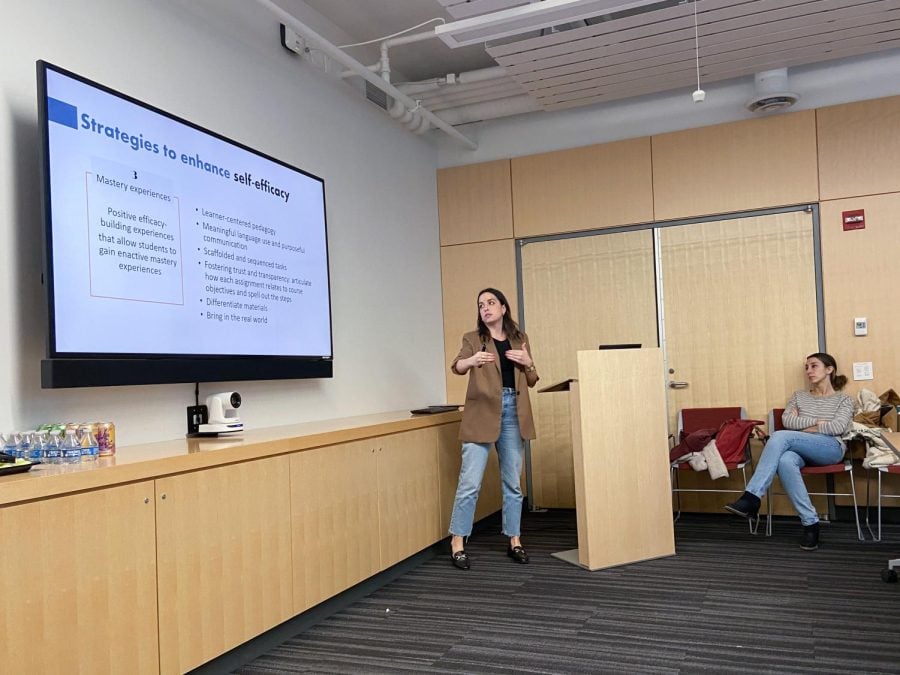Northwestern professors discuss improving language studies at TED Talk event
Fiona Roach/Daily Senior Staffer
Spanish and Portuguese Prof. Irene Finestrat presented on the importance of self-efficacy for language learning when.
March 2, 2023
Two Northwestern professors discussed encouraging self-efficacy in language studies and the promotion of Spanish as a heritage language as part of the Spanish and Portuguese Department’s Professional TED Talk series.
The talks, hosted Wednesday in the Alice Kaplan Institute for the Humanities by the Spanish Professional Development and Extracurricular Activities Committee, were the second in the department’s TED Talk series in which NU professors speak on topics that interest them.
“We started this new series of professional TED Talks to be able to showcase research from our faculty,” said Spanish and Portuguese Prof. Raquel Amorese, who is also chair of the Spanish Professional Development and Extracurricular Activities Committee. “We want to involve all our faculty, including teaching-track faculty and tenure-line faculty as well.”
Spanish and Portuguese Profs. Irene Finestrat and Julia Oliver Rajan presented to an audience of graduate students and faculty. Each presentation was followed by small group discussions in which attendees spoke about how to best incorporate the presented information into their curricula.
Finestrat spoke about strategies to promote student self-efficacy in language classrooms, which can result in greater improvement and increase a student’s efforts to complete more difficult tasks.
“Self-efficacy is not about the skills that students bring — it’s actually about the perceptions that they have, (believing) that they have the capability of completing the tasks,” she said. “More efficacious students are going to be the ones who are going to engage more with the language, and also the ones who are going to be more successful learning.”
In order to increase self-efficacy in language learners, Finestrat recommends professors utilize techniques like self-assessment activities to encourage students to focus on the process of learning a language, rather than just improving their grades.
Finestrat also referenced multiple personal anecdotes from students who reported feeling more confident and proud of themselves after completing these self-efficacy activities.
Oliver Rajan then spoke on the importance of offering language classes specifically for heritage speakers and the best teaching methods to use in these courses. She said students who grow up learning a different language at home have differing needs and skills than students who first learn a second language in the classroom.
“What happens for heritage speakers is they’re exposed to a minority language, specifically at home, and sometimes that language is stigmatized,” Oliver Rajan said. “It’s not a privilege dialect like the ones that we have in institutions.”
She said heritage speakers often need “spot-cleaning” for their language skills, which requires more focus on specific concepts rather than general ones.
Oliver Rajan said professors teaching courses to heritage speakers must make the effort to understand their students’ backgrounds to be as precise as possible in lessons.
In addition to encouraging instructors to know their students, Oliver Rajan emphasized that professors should also understand the long history of individuals speaking Spanish in the U.S.
“Spanish is not a foreign language in the United States — period,” Oliver Rajan said.
The Committee will host another activity in Spring Quarter with an increased focus on undergraduate students, according to Amorese. She said the committee hopes to make the event as interactive as possible for attendees.
She added that the Spanish and Portuguese Department hopes future activities will not only increase its visibility but also bring the language “alive” for students.
“We are trying to keep the tradition we just started,” Amorese said. “We’re trying to bring some people from outside to interact with our students.”
Email: [email protected]
Twitter: @fionaroach03
Related Stories:
— Language tables help NU students develop conversational and cultural skills
— Portuguese department hosts Carnavalentine celebration for students












